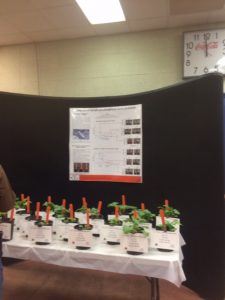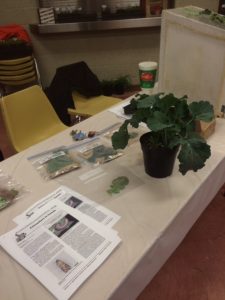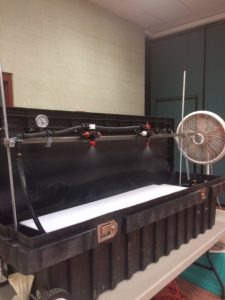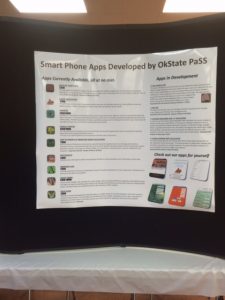Final report for SOK16-001
Project Information
Oklahoma State University and Langston University continue their commitment to the sustainability of agriculture by promoting economic viability; sound environmental/natural resource management, and awareness/recognition of social acceptability. This training POW builds upon and extends prior efforts. The goal of the program is to integrate sustainable agriculture practices into the mainstream agricultural practices of this region. Objectives remain to train agricultural professionals (OCES, federal/state agencies, and NGOs) and mentor farmers in the concepts and practices of sustainable agriculture as well as disseminating information regarding sustainable agriculture through various outlets. Topics to be emphasized are integrating sustainable practices into daily agricultural operations, management of animal waste, management of unwanted vegetation, integrated resource
management for large and small scale livestock and horticulture enterprises, strategic use of fertilizer and herbicides in wheat, production and marketing of organic and IPM certified products, sustainable forage-based livestock systems, sustainable viticulture production, alternative income through agrotourism, and production/marketing for community-based organizations. Training will be provided through attendance at national and regional workshops and trainings, experiential learning, demonstrations, tours, research presentations, online and small group in-service training.
Documentation will be conducted on an on-going basis and evaluation of trainee knowledge, attitudes, skills, actions and behavioral changes will be reported.
1) Thirty extension educators and twenty-five agricultural related personnel will include sustainable agricultural concepts into ongoing programming efforts such as cover cropping, crop rotations, value-added products and composting.
2) Thirty agriculture professionals will be able to provide information and education on organic and IPM certified production and marketing of agricultural products.
3) Twenty educators would incorporate community-based markets for fruit and vegetable production into programming.
4) Sixty extension educators and others will be able to provide information and education with respect to the environmentally sound management of natural resources - especially water, soil and air.
5) Eighty extension educators and others (agencies, producers, tribes, and NGOs) will have opportunities for joint trainings in community food systems, farmers markets, and food handling safety leading to cooperative efforts in sustainability for producers.
6) Twenty extension educators would be better prepared to assist and provide technical direction for producer driven research and on-farm demonstration activities through producer program granting opportunities such as the USDA and SARE.
7) Twenty to thirty educators and others will attend cropping systems and conservation tillage workshops to subsequently help producers in developing alternative economic opportunities in their operations to improve sustainability.
8) Forty professionals will be trained in composting and solid waste management.
9) Forty professionals will be trained in sustainable livestock practices to include beef, poultry, and goat production.
Advisors
- (Educator)
- (Educator and Researcher)
- (Educator and Researcher)
- (Educator and Researcher)
- (Educator and Researcher)
- (Educator and Researcher)
- (Educator)
- (Educator and Researcher)
- (Educator and Researcher)
- (Educator)
- (Educator and Researcher)
- (Educator and Researcher)
- (Educator and Researcher)
- (Educator and Researcher)
- (Educator and Researcher)
- (Educator and Researcher)
- (Educator)
- (Educator and Researcher)
- (Educator)
- (Educator and Researcher)
- (Educator)
- (Educator and Researcher)
- (Educator and Researcher)
- (Educator)
Education
As has been done in years' past, the OkSARE PDP continues to nuture collaborative relationships with other groups within our region involved in the advancement of sustainable agriculture. These collaborative relationships allow us to leverage our resources in order to maximize the impact and effectiveness of our program inputs. There were a variety of approaches used in the implementation of this project. These approaches ranged from updating of printed educational materials and their subsequent distribution to identified target audiences to facilitating farm tours for educators and producers to experience first-hand accounts of sustainable production practices on various types of farms across the state. Many of our programs involved audio-visual presentations coupled with the hands-on opportunity to see concrete examples of the material presented in a learning lab set up on-site. These learning labs are used extensively at many of our programs by state specialists and may contain such things as insects, plant diseases, soil conditions, interactive maps and computer/smart phone applications designed at Oklahoma State University.
Education & Outreach Initiatives
*Educators and related personnel will include sustainable agricultural concepts into ongoing programming efforts such as cover cropping, crop rotations, value-added products and composting.
*Ag Professionals will be able to provide information and education on organic and IPM certified production and marketing of agricultural products.
*Educators would incorporate community-based markets for fruit and vegetable production into programming.
*Extension educators and others will be able to provide information and education with respect to the environmentally sound management of natural resources - especially water, soil and air.
The Oklahoma Women in Agriculture and Small Businesses Conference is designed to encourage the participation of women in agricultural and related small business enterprises. This two-day event was held on August 3rd and 4th in Moore, Oklahoma. There were 230 in attendance. For further information on this event, please visit:
This event continues to set very high standards for programming year after year. The OkSARE PDP is pleased to report that there has been a substantial increase in the participation of women and minorities in agriculture and rural small businesses as a result of this yearly conference. Each year this training reports extremely favorable feedback responses and that the opportunities for informal networking between participants and interaction with conference experts often lead to personal and professional inspiration, ideas and solutions. This year, 97 % of participants from the statewide conference responded very positively to the information, education and/or workshops provided, citing the overall satisfaction of the conference as “Good” or “Excellent”. As a result of the programs, attendees said they would “be able to take a stronger role in their farm/ranch business” and will be able “to improve [their] operation”. It was also noted that the programing will assist them in “starting and growing [their] business”. On the program evaluation survey, participants were able to estimate the annual economic benefit to their operation from attending the two-day conference, with the average amount at $1,500 and outlier amount of $100,000. The statewide conference has also encouraged the launch of several regional women in agriculture conferences around the state.
*Educators and others will attend cropping systems and conservation tillage workshops to subsequently help producers in developing alternative economic opportunities in their operations to improve sustainability.
*Extension educators and others will be able to provide information and education with respect to the environmentally sound management of natural resources - especially water, soil and air.
*Agricultural related personnel will include sustainable agricultural concepts into ongoing programming efforts such as cover cropping, crop rotations, value-added products.
The 2017 No-till Oklahoma Conference was held on March 1st and 2nd in Shawnee, Oklahoma. There were 206 people in attendance. General information regarding the conference can be found at the following: 2016-NTOK-Program
For a detailed listing of the information presented at the conference, please visit: http://notill.okstate.edu/presentations/2016-presentation
The No-till Oklahoma Conference has proven to be a very valuable tool for the Oklahoma crop producers who are interested in learning the latest in management practices aimed at reducing input costs while preserving or improving soil and water quality. The attendees rated the overall quality of this conference at 4.85/5.0. The respondents for this event also reported an average estimated value of information gained at this conference as $5.00/acre. As they further reported that there were in excess of 200,000 acres impacted as a direct result of this training, the overall respondent value placed on the information gained at this conference at $1,000,000.00.
*Agricultural professionals will be trained in sustainable livestock practices to include beef, poultry, and goat production.
*Agricultural related personnel will include sustainable agricultural concepts into ongoing programming efforts such as value-added products and composting.
The Langston University Goat Conference was held on April 29th at Langston University in Langston, Oklahoma. There were 228 people in attendance. The website for further information can be found at: http://www.luresext.edu/?q=2017-goat-field-day
This event is held each spring and draws attendees from all across this region. There were attendees from six states this year. The conference garners quite favorable feedback with most rating the program 4.0/5.0 scale.
*Agricultural related personnel will include sustainable agricultural concepts into ongoing programming efforts such value-added products and composting.
*Educators and others will be able to provide information and education with respect to the environmentally sound management of natural resources - especially water, soil and air.
The Native Plants Horticulture Conference was held on Wednesday, May 31st in Stillwater, Oklahoma. The event was attended by 185 people. Plants indigenous to the Lower 48 were discussed by leading native plant advocates. The speaker lineup included Gerald Klingaman, Botanical Garden of the Ozarks, Bill Farris, Prairie Wind Nursery, David Redhage, Kerr Center, Bruce Hoagland, University of Oklahoma, Eric Rebek, OSU and more. The meeting was co-chaired by Cheryl Mihalko and Mike Schnelle, Department of Horticulture and Landscape Architecture, OSU, this event also included growers green industry professionals, landscape designer's, landscape architects on the topics of natives, nativars, and plant availability in a mid-day panel discussion.
This program was quite well received by the registrants. They reported that it is important to be able to recognize native species and encourage their use in urban and suburban settings as they tend to be more disease and drought resistant. Perhaps the greatest impact was that attendees remarked on their greater appreciation for the diversity of plant materials outside Oklahoma yet suitable to grow in this region (OK).
*Professionals will be able to provide information and education on organic and IPM certified production and marketing of agricultural products.
*Educators would incorporate community-based markets for fruit and vegetable production into programming.
*Educators and others (agencies, producers, tribes, and NGOs) will have opportunities for joint trainings in community food systems, farmers markets, and food handling safety leading to cooperative efforts in sustainability for producers.
The Organic Oklahoma Conference was held in Oklahoma City on October 6th and 7th. There were 65 people in attendance. The agenda for the training can be seen at: 2016-Organic-Oklahoma-October-Workshop-Agenda-Final
The learning and action outcomes from this training show that while the program may have been sparsely attended, the quality of the information gained was reported to be 4.8/5.0 scale. There is a growing interest in this yearly event and attendees have all indicated that they will be continuing to support this valuable program. This initiative was originally begun as a collaborative effort between the NRCS, OSU Extension, the Oklahoma Dept. of Ag, the Oklahoma Conservation Commission and several NGO's and tribal organizations. As of this summer, the administration of the Organic Oklahoma program was been assumed by the OSU Plant and Soil Science Department who continues the collaborative relationship with the previously mentioned groups and anticipates continued steady growth for this initiative.
*Educators and others will be able to provide information and education with respect to the environmentally sound management of natural resources - especially water, soil and air.
*Educators would incorporate community-based markets for fruit and vegetable production into programming.
*Professionals will be able to provide information and education on organic and IPM certified production and marketing of agricultural products.
The Global Horticulture Conference was held on October 26th in Stillwater, Oklahoma. This event was attended by 82 people. This event was designed for plant-minded people that are also open to plant materials and their cultural issues from outside of the United States. Speakers from industry and academia co-instructed this event. During breaks, fruits and vegetables from across the globe were highlighted and available to taste. Presenters not only discussed horticultural crops but also cultural issues regarding the country or region discussed. Of particular interest was the presentations from several graduate students on their international internship experiences.
Attendees were exposed to plant materials and cultural techniques from over 12 countries. Furthermore, participants were able to learn more about the critical role women play in agriculture across the world. Lastly, over seven novel fruits not available in this region were highlighted and passed out to actually taste. Of further importance, one of the key impacts from this program highlighted the universality of the issues involving agriculture, particularly in this ever-shrinking world.
*Educators and others will attend cropping systems and conservation tillage workshops to subsequently help producers in developing alternative economic opportunities in their operations to improve sustainability.
*Educators and others will be able to provide information and education with respect to the environmentally sound management of natural resources - especially water, soil and air.
*Educators would be better prepared to assist and provide technical direction for producer driven research and on-farm demonstration activities through producer program granting opportunities such as the USDA and SARE.
The 2016 Winter Crop School was held on December 13th and 14th in Stillwater, Oklahoma. The 2016 Winter Crops school had record level of attendance of nearly 200 individuals. The audience consisted of Certified Crop Advisors (CCA), OCES Educators, and producers. Over the course of 1.5 days the audience learned about managing herbicide resistance, intensifying cropping systems, alternative forage crops, maximize nutrient use efficiencies, new IPM techniques and soil and water conservation practices. During the event 12 CCA continuing educational units (CEUs) and 4 Oklahoma Department of Ag CEUs were provided. The audience consisted of individuals from all across the state and represented millions of acres of production.
Further information regarding a description of the program can be found at: 2016-OSU-Winter-Crops-School1
The impact to the commodity production in Oklahoma from this program can best be described as key. This event supplies very important training for certified crop advisors as well as pesticide applicators. These two groups are required to attend trainings each year in order to earn continuing education units for their ongoing certification. It is imperative that these required trainings contain information related to sustainability and soil/water quality issues to protect our Oklahoma natural resources.
*Educators and others will attend cropping systems and conservation tillage workshops to subsequently help producers in developing alternative economic opportunities in their operations to improve sustainability.
*Educators and others will be able to provide information and education with respect to the environmentally sound management of natural resources - especially water, soil and air.
The 2017 Canola College was held on January 19 in Enid, Oklahoma. There were 280 people in attendance. A detailed description of the program can be seen at:
Possibly the greatest learning and action outcome from this event were the 500+ contacts reported in the Canola Learning Lab which was set-up at this event. Attendees had the opportunity to view actual examples of insect infestation on canola plants. This is becoming quite an economic issue with aphids in canola. In addition to insect damage, there were also examples of diseases and soil quality impacts on canola plants. One of the most popular exhibits in the Learning Lab was the spray nozzle demonstration. Please see the following pictures:


*Educators and others will attend cropping systems and conservation tillage workshops to subsequently help producers in developing alternative economic opportunities in their operations to improve sustainability.
*Educators would be better prepared to assist and provide technical direction for producer driven research and on-farm demonstration activities through producer program granting opportunities such as the USDA and SARE.
*Educators and others will be able to provide information and education with respect to the environmentally sound management of natural resources - especially water, soil and air.
*Agricultural related personnel will include sustainable agricultural concepts into ongoing programming efforts such as cover cropping, crop rotations
In the month of July, OkSARE teamed up with several commodity groups within the state of Oklahoma to co-sponsor a series of four Summer Crops Conferences. They were held as follows:
Summer Crop Conference #1 was held on July 10th in Ardmore, Oklahoma. It was attended by 25 people.
Summer Crop Conference #2 was held on July 13th in El Reno, Oklahoma. It was attended by 52 people.
Summer Crop Conference #3 was held on July 17th in Alva, Oklahoma. It was attended by 68 people.
Summer Crop Conference #4 was held on July 20th in Afton, Oklahoma. It was attended by 48 people.
Further detailed information regarding each of these four region specific meetings can be seen by visiting these event agendas....2017-OSU-Summer-Crops-Tour-Itineraries
By leveraging our OkSARE PDP funding with that of other commodity groups it was possible for each district/area meeting to be tailored to that particular area. As can be seen when viewing the itineraries above, each meeting was designed specifically for the concerns and issues facing producers in that area. This level of specificity is generally not possible when holding events for the entire state. This was the first year to attempt a series of smaller trainings geared to the specific needs of each area. It was quite well received. Attendees enjoyed the site specific information and the small intimate groups allowed for greater interaction and idea exchange between participants. At each of these events, the OkSARE PDP was able to engage each individual and we have received valuable feedback which will be used in planning training events for the coming year.
*Educators would incorporate community-based markets for fruit and vegetable production into programming.
*Educators and others (agencies, producers, tribes, and NGOs) will have opportunities for joint trainings in community food systems, farmers markets, and food handling safety leading to cooperative efforts in sustainability for producers.
*Educators and others will be able to provide information and education with respect to the environmentally sound management of natural resources - especially water, soil and air.
*Agricultural related personnel will include sustainable agricultural concepts into ongoing programming efforts such as value-added products and composting
In 2017 a series of Alternative Crops Workshops were held in the eastern part of the state to support the continued growth of community based markets. These workshops were held in cooperation with several tribal and ethnic groups active in growing for farmer's markets. These three workshops were supported by OkSARE in the distribution of published educational materials and the participation of OkSARE sponsored speakers.
It remains imperative that groups active in our local food systems have access to approved trainings in food safety and biosecurity. To that end, OkSARE PDP continues to support the development of programs approved to train these producers and their cooperatives in the paradigm mandated by the Food Safety and Modernization Act. This legislation will have far reaching impacts for our local food markets and OkSARE is committed to assisting with efforts designed to prepare our producers to meet these guidelines.
*Educators would be better prepared to assist and provide technical direction for producer driven research and on-farm demonstration activities through producer program granting opportunities such as the USDA and SARE.
*Educators will include sustainable agricultural concepts into ongoing programming efforts such as cover cropping, crop rotations, value-added products and composting.
The OkSARE PDP is actively involved in the biannual training of new extension educators. This meeting is held each fall and again in the early summer. Each Educator is brought to Stillwater for a week long intensive training including each academic and service department on campus. To assist with the education of these new extension personnel, a packet of educational materials are compiled and distributed to each new agent. Additionally, each agent is presented with information regarding the SARE Grants Program. They are provided with a description of each program and supporting documents in the effort to encourage a greater participation in grantsmanship at the county and area level.
It is important that newcomers to extension are provided with exposure to SARE programming early in their careers. These efforts appear to be having a long-term impact as in the last few years, there is a measurable increase in the willingness in these young professionals to engage in research and to request assistance from the OkSARE PDP when desiring to expand their professional development through attendance at trainings and events.
*Professionals will be trained in composting and solid waste management.
*Educators and others (agencies, producers, tribes, and NGOs) will have opportunities for joint trainings in community food systems, farmers markets, and food handling safety leading to cooperative efforts in sustainability for producers.
The OkSARE PDP provides opportunities for those interested in the various small one-day programs held around the state to attend. These programs are generally attended free of charge or with a minimal registration fee which can be covered by OkSARE. Examples of several of these events include:
The Oklahoma Department of Agriculture, Food and Forestry Sweet Potato Field Day
The Oklahoma Plasticulture Conference
The ODAFF Strawberry Production Field Day
The Horticulture Industries Show
The Family Centered Ag Enterprises Field Day
These small group attendances at various events held in our state have become very popular and provide valuable exposure for educators to different enterprises. This has been shown to encourage 'out of the box' thinking and stimulates interest in alternative production methods or value-added product development.
Educational & Outreach Activities
Participation Summary:
Learning Outcomes
Project Outcomes
The shifting from printed material to electronic media seems to be continuing. What is proving to be important to many of our producers and educators is the ability to access information instantly and to receive updated information in real time. Webinars, YouTube videos and posting of updated information on social media has become expected. Additionally, the set of applications (apps) developed by OSU are continuing to be very popular with our target audience. These apps have been developed by OkSARE PDP cooperators. For further information on these apps, please see below....

Through conversations held with participants at various events in recent months, there have been several areas which have proven of interest. They are...
1. Have there been any sociological studies done to take a look at burnout in farmers and ranchers. There seems to be a fairly high numbers of farmers (particularly small producers) who are in production for fewer than five years.
2. There seems to be a real need for training people involved in the banking/lending profession as well as real estate agents and developers in issues related to sustainable agriculture.
3. City and municipality employees/officials to obtain training in issues related to sustainable agriculture.
Face of SARE
The Oklahoma Sustainable Agriculture Professional Development Program is extremely active in expanding the outreach and promotion of sustainable agriculture in Oklahoma. To this end, the Advisory Committee is instrumental. The OkSARE PDP advisory committee represents diversity in relation to our state. It has fifteen members representing the three largest minority communities in the state, seven female members, and numerous small and large producers from different geographic regions. It has members representing NGOs, agencies, community-based groups and extension.
We utilize feedback from subgroups in different parts of the state which focus on specific issues such as community markets and small grazing-livestock operations; lowering fertilizer and herbicide inputs in wheat production; meat and dairy goat production; conservation tillage and cropping systems, organic production and marketing; developing on-farm, natural resource based tourism; and urban-based sustainable agriculture. These subgroups function more effectively than one large advisory group. We generate our priorities from the information gathered from these groups annually and the whole advisory committee continually.